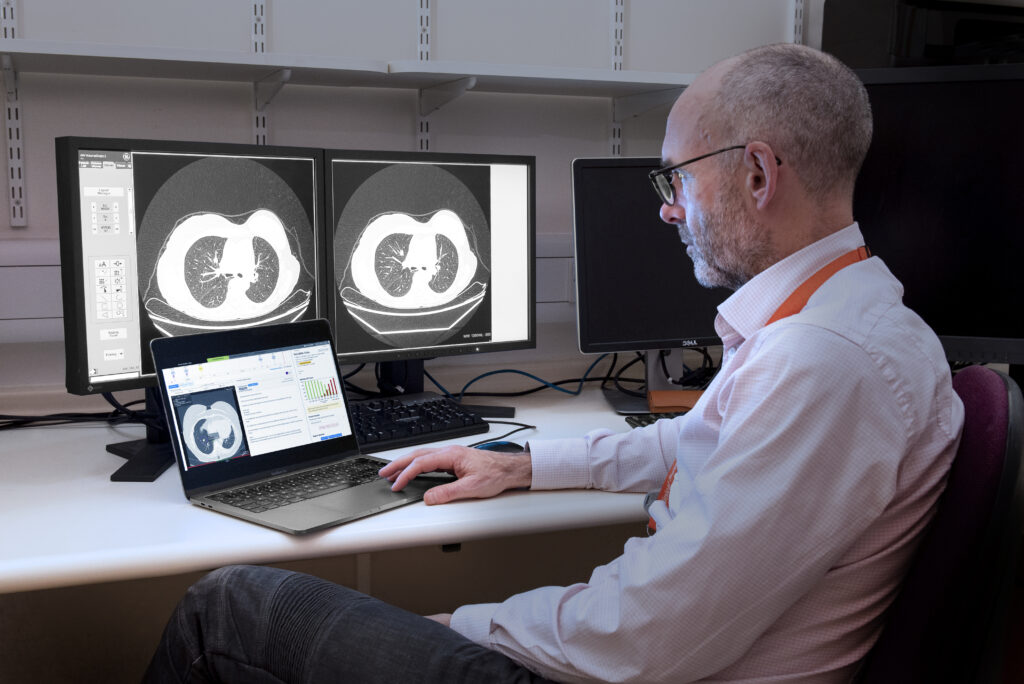Optellum’s AI-powered Virtual Nodule Clinic is paving the way for AI-enabled lung cancer screening and diagnosis in the NHS with significant investor backing, a raft of clinical validation studies and the green light from regulators.
Lung cancer is the third most common form of cancer in the UK and the most common form of cancer death globally, with 1.8 million people dying from lung cancer each year. For patients, survival rates are heavily dependent on the stage of diagnosis, with the five-year survival of stage 1 and stage 4 lung cancer being 57% and 3%, respectively.
In the NHS, the need for a faster pathway from lung cancer referral to diagnosis was highlighted in 2018 due to the high proportion of patients receiving a late-stage diagnosis and the likelihood that GPs will miss early signs of cancer.
Lung cancer is primarily found in older people and can be detected in any routine Computed Tomography (CT) scan involving the chest area, highlighting an opportunity to flag at-risk patients by assessing routine scans for other conditions.
An innovation to catalyse new ways of working
Such a transformative approach requires a step change in how healthcare systems and the workforce come together across different settings and specialties, facilitated by the development of a new diagnostic pathway that utilises routine CT scan data from other systems.
Optellum’s Virtual Nodule Clinic incorporates AI-powered clinical decision support software to plug this gap, aiding clinicians to identify and track at risk-patients so they receive early diagnosis and treatment before their cancer metastasises.
The Virtual Nodule Clinical includes support for two key functions in the early lung cancer diagnosis pathway. Firstly, routine scans from radiology reports are automatically uploaded into the Virtual Nodule Clinic where patients with lung nodules are flagged to the clinician, with a dashboard to facilitate and track their care.
Secondly, Optellum’s AI software automatically analyses the 3D image in seconds and assigns a clinically validated nodule-specific Lung Cancer Prediction score, which indicates the risk of a nodule as cancerous. This information aids clinicians to make rapid and optical management decisions for each at-risk patient.
Optellum’s origins and clinical partnerships
Since it was founded in 2017 by a team of medical technology experts from the University of Oxford’s Department of Engineering, Optellum’s development and growth as an innovative Oxford-based SME has been enabled with funding from Innovate UK, the National Institute for Health and Care Research, NHS England, MedCity and EITHealth.
This investment has paved the way for a series of multi-centre development and validation studies in several NHS and international clinical settings, where Optellum’s team have worked in collaboration with clinical partners to train their complex AI. Further research is evaluating its ability to predict malignancy in patients by comparing its output with data from thousands of lung cancer nodules where a diagnosis is known.
The most recent of these studies, DOLCE, will determine whether clinical decision-making with the Virtual Nodule Clinic can generate both clinical and health-economic benefits over and above standard levels of care for patients. Funded as part of NHS AI Lab’s £140 million AI in Health and Award, the study runs until mid-2024 and is recruiting 2000 patients in partnership with ten NHS hospitals in Derby, Leeds, Leicester, London, Nottingham and Oxford.
Breaking new ground in regulatory approval and adoption
Following landmark FDA 510(k) clearance in 2021, the Virtual Nodule Clinic was installed at Wake Forest Baptist Health in August 2020, an academic medical centre and health system serving populations across North Carolina and Virginia in the US. Here, the platform is streamlining the assessment of pulmonary nodules in over 500 patients each year.
Optellum attained CE-MDR and UKCA clearance in the UK and Europe in 2022, making Optellum the first and only MedTech company to attain regulatory approval across the US, UK and Europe for AI decision support for early lung cancer diagnosis.
Optellum’s platform was one of two AI-based technologies shortlisted in Health Education England’s AI Roadmap Report, which sets out the process for adopting and spreading AI in the NHS. The report highlights the Virtual Nodule Clinic’s potential to impact on different clinical workforce groups, the range of benefits it can bring to patients, and the contribution it will make to increasing health system performance and efficiency.
In June 2022, the Centers for Medicare & Medicaid Services (CMS) established a national payment rate for Optellum’s Lung Cancer Prediction technology in the US. This development facilitates the process of health insurance claims for individuals enrolled in Medicare and other health insurance programs, enabling US patients to access innovative, potentially life-saving early lung cancer diagnostic technology.
In September 2022, the company’s expansion and commercial deployment plans were boosted when it successfully raised $14 million in a series A funding round led by Mercia.
With strong support from investors, years of collaborative research and clinical trial data, and strategic partnerships with GE Healthcare and Johnson & Johnson, Optellum is well positioned to expand further development and adoption of its Virtual Nodule Clinical, so patients nationally and internationally can access faster, personalised diagnosis and greater efficiency in lung cancer screening services.

